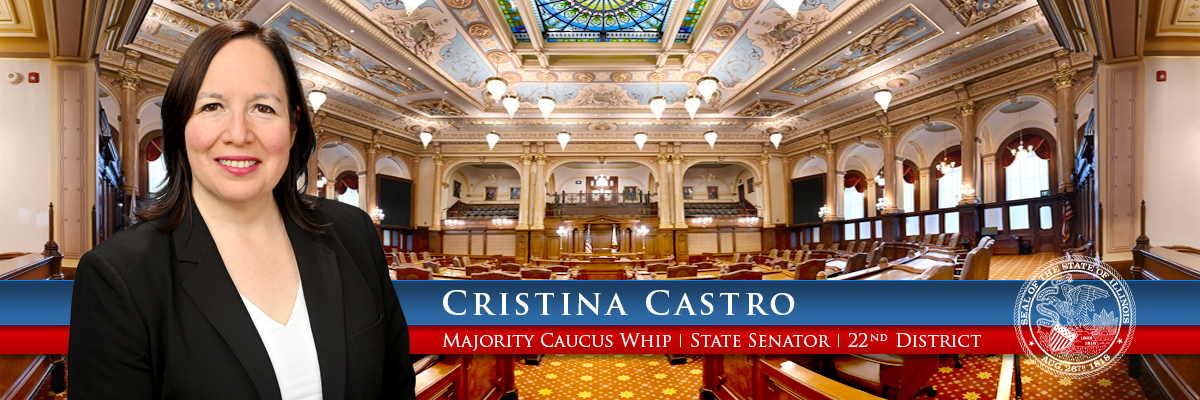- Details
- Category: News
 Firefighters serve a core role in Illinois public safety and put their lives at risk every day in the line of duty. Starting Jan. 1, a law spearheaded by State Senator Cristina Castro enhances transparency for firefighters and their loved ones by requiring the state to begin tracking death records.
Firefighters serve a core role in Illinois public safety and put their lives at risk every day in the line of duty. Starting Jan. 1, a law spearheaded by State Senator Cristina Castro enhances transparency for firefighters and their loved ones by requiring the state to begin tracking death records.
“We owe nothing less than our full gratitude and appreciation to those who put their lives on the line for our communities,” said Castro (D-Elgin). “The dangers that they face go beyond fighting physical fires that are in front of them as we are continuing to learn firefighters suffer silently from illnesses related to their job.”
- Details
- Category: News
 A new law led by State Senator Cristina Castro will make a temporary “cocktails to-go” state law permanent and create new rules to allow more small Illinois distilleries to self-distribute spirits.
A new law led by State Senator Cristina Castro will make a temporary “cocktails to-go” state law permanent and create new rules to allow more small Illinois distilleries to self-distribute spirits.
“Supporting restaurants and bars is also supporting small distilleries and local producers across the state,” said Castro (D-Elgin). “We want to make sure local businesses have the easiest path possible to operate, succeed and create jobs in our communities.”
Senate Bill 618 creates a class 3 craft distiller’s license, which allows distilleries to manufacture up to 100,000 gallons of spirits annually. These licensees can then apply for the ability to self-distribute up to 2,500 gallons annually.
- Details
- Category: News
 After federal immigration agents arrested a suburban community college student while on campus this September, State Senator Cristina Castro supported a new law protecting Illinois residents in locations such as daycares, hospitals and college campuses amid ongoing federal raids.
After federal immigration agents arrested a suburban community college student while on campus this September, State Senator Cristina Castro supported a new law protecting Illinois residents in locations such as daycares, hospitals and college campuses amid ongoing federal raids.
“Our immigrant neighbors have remained in the crosshairs of this federal administration for daring to reach for the American Dream,” said Castro (D-Elgin). “This law makes good on the promise that all people, no matter their immigration status, are able to pursue that dream without fear.”
The law encompasses initiatives to protect Illinois residents’ constitutional rights and ensure safe access to public spaces amid increasingly aggressive violations of those rights across the state.
- Details
- Category: News

SPRINGFIELD — State Senator Cristina Castro backed a property tax relief package that increases property tax exemption thresholds for senior citizens in Illinois.
“We have a duty to uplift our most vulnerable communities, especially seniors who have worked hard to stay in their homes and provide for their families,” said Castro (D-Elgin). “This bill will increase the number of seniors who can qualify for property tax relief and ensures older adults are well protected during these times of increased cost of living.”
Senate bill 642 would deliver critical updates to help seniors on fixed incomes and help families facing economic challenges manage rising property tax costs. Under the measure, the maximum income limit for the Low-Income Senior Citizens Assessment Freeze Homestead Exemption would increase substantially over the next several years, beginning at $75,000 for taxable year 2026, increasing to $77,000 for taxable year 2027 and settling at $79,000 for taxable year 2028 and beyond.
To address gentrification issues, it would also add an occupancy requirement, stating seniors must have owned and lived in their home for at least three years. This expanded threshold would allow thousands of additional seniors across Illinois to qualify for the property tax freeze – helping them stay in their homes and maintain financial security as the cost of living continues to rise.
The bill would also create a new property tax repayment plan, giving counties the authority to establish structured payment options for homeowners with unpaid taxes. For the 2025 tax year, unpaid taxes would begin accruing interest at a reduced rate, providing taxpayers more time and flexibility to meet their obligations without facing harsh penalties. Counties would be able to offer payment plans during the redemption period and waive interest penalties for participants who comply with their plan’s terms – making it easier for older adults to recover from temporary financial setbacks.
Senate Bill 642 passed the Senate and heads to the governor for further consideration.
More Articles …
Page 1 of 112








